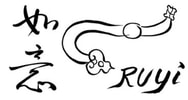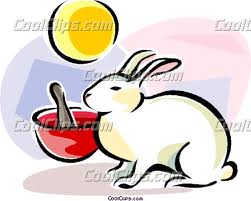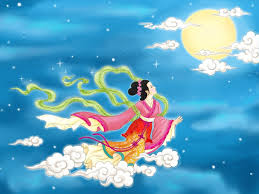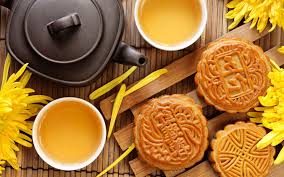|
Each year around end of August and beginning of September, people in China begin to take time off from work to go home for the Moon Festival, or Mid-autumn holiday, which falls on the 15th day of the 8th moon by the Lunar Calendar. Of all the full moon nights why is this one more important? Because it is traditionally a time in the year after harvest to gather with family in a circle to view the special full moon, drink tea and eat moon cakes after a family dinner. In Chinese, we call it "Tuan Yuan", 團圓, meaning everyone is together and everything is full and perfect. That is also why most Chinese dinner tables are usually circular for good luck and practically because it can fit more people than a square table also. This holiday is almost as important as the Chinese new year for the Chinese families.
When we were kids in China, this was usually a cooler evening with crickets chirping, fire flies glowing in the dark, and the bright moon huge and round in the sky. We would sit on bamboo or rattan garden chairs sipping tea and munching on little pieces of moon cakes. My grandmother would use her huge goose feather fan to chase away mosquitoes or other insects while she told stories about Chan Er, the lady in the moon, and her jade rabbit assistant who is stirring herbal medicine in a pot. Legend has it that Chan Er was the wife of a famous archer, Hou Yi, who shot down several suns in the sky to save the people from dying of the draught. However, after he became the hero of the nation, he turned mean and selfish. He went to the Jade Empress of the Western Skies to seek immortality potions because he thought he was so great that he should live forever. But he had become a menace to his family and the people. So Chan Er did a courageous thing by hiding the potion from Hou Yi. But when he used brute force against her, in a panic, she swallowed the potion instead. To her surprise, she began to ascend to the heavens and ended up in the Jade Palace in the moon. The Jade Empress gave her the job to be the keeper and to work on healing herbs to benefit humanity with the assistance of her Jade Rabbit. Needless to say, Hou Yi did not gain immortality except to pine for his lovely wife and died in regret and sorrow. Like most Chinese fables, there is always a moral to the story. This particular version is different because of the twist in the ending. It seems an interesting story with multifaceted lesson and food for thought for everyone. So, tea, moon cakes and stories, anyone? 0ops, did I just make a "Pun"? I like this English word also because "Pun" happens to be "Bread" in modern Japanese. The multicultural connections continues. Happy autumn, everyone, I am signing off in Taos, New Mexico, U.S.A.
1 Comment
|
AuthorPearl Weng Liang Huang, Founder of
|




 RSS Feed
RSS Feed